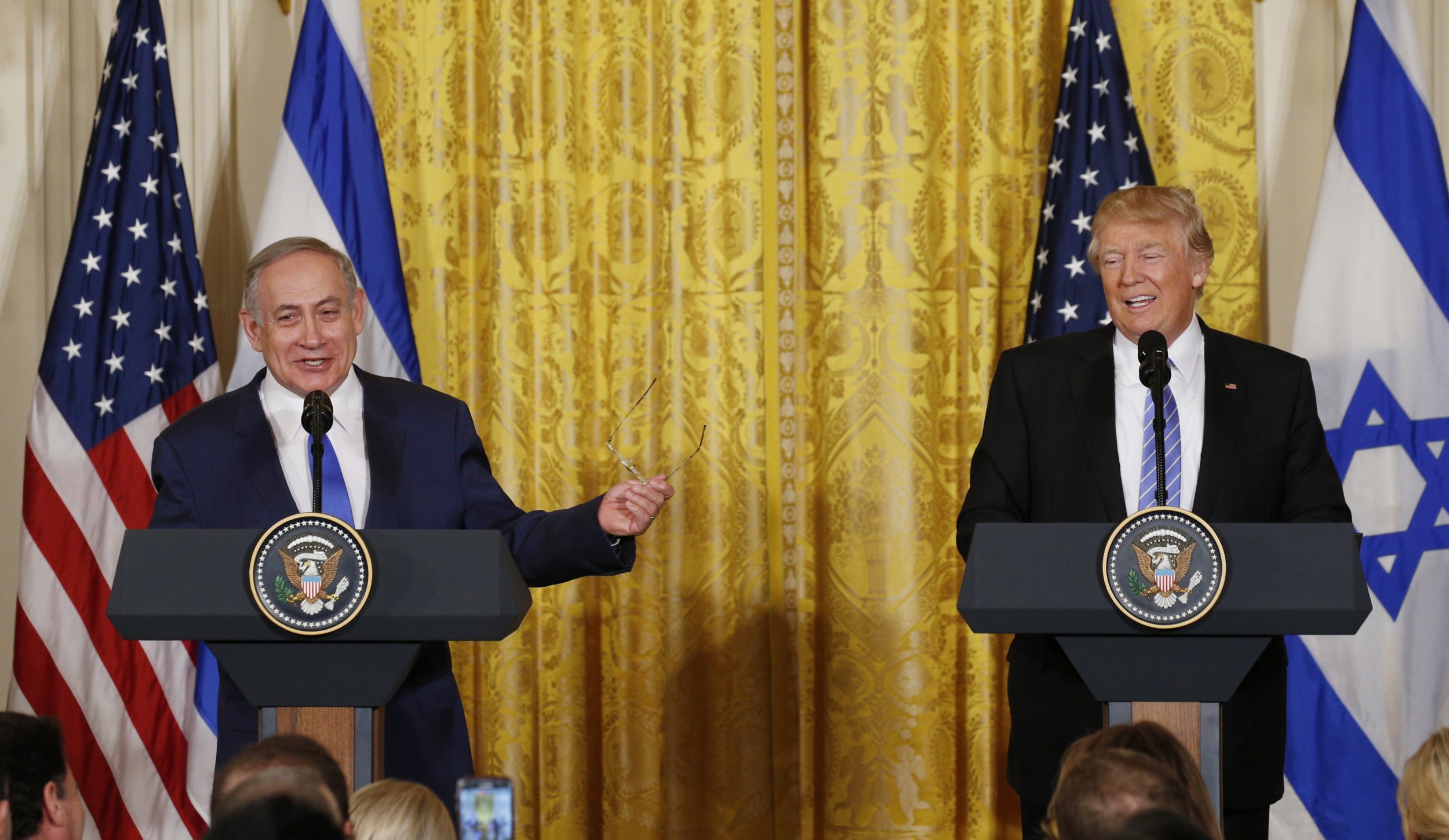
Israelis, Palestinians, and many others around the world watched eagerly for the outcomes of U.S. President Donald Trump's meeting with Israeli Prime Minister Benjamin Netanyahu. Everyone was waiting to hear the numbers. Not the score, but the numbers—ones that would divine the future of Israelis and Palestinians. What will it be—one or two? (States, of course.) But when it was all over, Netanyahu said neither and Trump said either. In their rush to criticize Trump for putting the possibility of a one-state solution on the table, supporters of a two-state solution missed the most important thing the president said and the words that made me optimistic.
The president of the United States identified peace as his central goal; peace that comes as the result of a deal agreed to by both sides. As an Israeli, as someone who entered politics out of a deep understanding that peace is a distinct Israeli interest and who served as the Israeli chief negotiator for peace, this is encouraging.
Both sides need to agree to the nature of the solution, Trump said. Whatever the two sides agree upon, that will make me happy, he continued. He is right: Without two sides agreeing, there can be no agreement. And while usually it takes two to tango, in our case, we may need a few more dancers.
The United States will undoubtedly be a central player for such an agreement, but we should not underestimate the role of the pragmatic, moderate Arab states. Of course, bringing in the Arab world as an additional player will in no way replace the need for the two sides—Israelis and Palestinians—to negotiate directly with each other to get a deal. The Arab world's involvement simply strengthens the possibility that such a deal may occur. And while Israel and the moderate Arab world certainly have a shared interest in creating united front against regional extremist terror, their relationship has a glass ceiling: the Israeli-Palestinian conflict. The resolution of this conflict, according to the Arab Peace Initiative, peace between Israel and the Palestinians would normalize relations between Israel and its Arab neighbors. This, a powerful shift in the strategic makeup of the Middle East, is what Israel stands to gain by making peace with the Palestinians. The support of the Arab world is also critical for any compromise that the Palestinians come to in the framework of the negotiations.
By putting the central question of two states versus one on the table, Trump forces us to make a decision and I have a clear position on this critical issue. Trump's willingness to think outside of the box is welcomed. This conflict demands creative thinking. But I believe that the best and ultimately the only solution that serves the interests of both sides will be based on two states for two peoples.
Read more: Israel welcomes the return of the U.S. superpower under Donald Trump
As an Israeli, I have always looked for what is in the best interests of Israel. With this focus on Israel, my vision has been one in which the state is both Jewish and democratic. Israel must be a place where the Jewish people realize their right to self-determination, as well as a state in which all citizens have full, equal rights irrespective of their religion, race or sex.
In order for these two values to exist simultaneously, I must make a choice. Either maintain the entire Land of Israel where all citizens have full equality—in other words, one, bi-national or Arab majority state for two people—or divide the land into two states, and maintain Israel's Jewish character. This is the choice that stands before each us. Ultimately the only way both nations can realize their right to self-determination and resolve this national conflict is through the creation of two separate nation states. This was in many ways the basis for the Partition Plan in 1947, and has consistently been the basis for any future, win-win agreement. And this is why it is not enough to merely speak of two states but it must be clear that it's two states for two peoples. The world's task is not to create another state, but to solve a national conflict by giving an answer to the national aspirations of two peoples.
Negotiations are not meant to help determine whose narrative is more "just." They are a time to discuss how we—Israelis and Palestinians—can amicably separate from one another, as we might in a friendly divorce. The other option—staying together in a one state configuration—will result in a bloody lose-lose. But separation is only possible if both sides put away their ultimate national aspirations to the Whole Land. This is something that the Palestinians as well as Zionist Israelis like myself, who see our claim to this land as inscribed in the Bible, will need to do.
That Trump brought "peace" back into the conversation is no small thing. With renewed optimism, we now need to make a good deal. I wish us all much luck.
Tzipi Livni is former Israeli foreign minister and peace negotiator, who currently serves as a member of the Israeli parliament, the Knesset.
Uncommon Knowledge
Newsweek is committed to challenging conventional wisdom and finding connections in the search for common ground.
Newsweek is committed to challenging conventional wisdom and finding connections in the search for common ground.
About the writer
To read how Newsweek uses AI as a newsroom tool, Click here.








